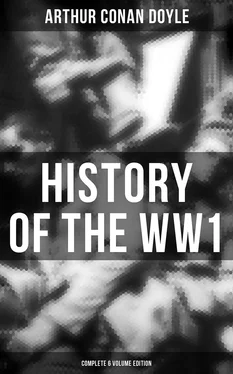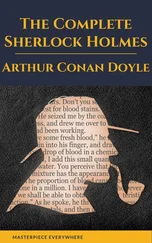But already he had conceived the idea of a campaign of attrition, and, looking forward into the years, he was convinced that these forces were insufficient. Some entirely new cadres must be organised, which should have no limitations, but be as reliable an instrument as the regular forces of the Crown. With a prescience which found no counterpart either among our friends or our foes he fixed three years as a probable term for the war, and he made preparation accordingly. Early in August he called for half a million fresh volunteers for the war, and early in October he had got them. Still unsatisfied, he called for yet another half-million, and before Christmas his numbers were again complete. It was a wonderful autumn and winter in Britain. Every common and green was loud with the cries of the instructors, and bare with the tramp of the men. Nothing has ever been seen in the world’s history which can compare in patriotic effort with that rally to the flag, for no bounty was offered, and no compulsion used. The spirit of the men was extraordinarily high. Regiments were filled with gentlemen who gave up every amenity of life in order to face an arduous and dangerous campaign, while even greater patriotism was shown by the countless thousands of miners, artisans, and other well-paid workmen who sacrificed high wages and a home life in order to serve for an indefinite time upon the humble pay of the soldier, leaving, very often, a wife and children in straitened circumstances behind them. It is at such times that a democratic country reaps the rich fruits of its democracy, for if you make the land such that it is good to live in, so also does it become good to die for. These forces could not be ready, even with the best of wills, and the most intensive culture, before the summer of 1915, but at that date, including her sea forces. Great Britain had not less than 2,000,000 volunteers under arms and ready for immediate use, a number which had risen to 4,000,000 by the end of that year, and 5,000,000 by the spring of 1916.
So much for the wise provisions of Lord Kitchener, which would have been useless had they not been supported by a stern and self-sacrificing national spirit. The crisis was met with a cold determination which gave some superficial observers the impression that the nation was listless, when it was, in truth, far too earnest for mere shoutings or flag-waving. “Wakened at last!” cried some foreign cartoon when a German outrage aroused the country for an instant to some visible gleam of wrath. A deeper observer might have known that a country which finds 5,000,000 volunteer fighters, and which, instead of putting the expenses of the war upon future generations, as was done by Germany, elects to meet a considerable proportion of them by present taxation, is in grim earnest from the start. The income tax was doubled without a remonstrance by a unanimous vote of the Commons, thus finding an extra £40,000,000 a year for the prosecution of the war. Other taxes were levied by which the working classes bore their air share of the burden, and they also elicited no complaints. Before Christmas no less than £450,000,000 had been raised by a loan, a gigantic financial effort which was easily borne at a charge of 4 per cent.
But if Britain was able to face the future with confidence, both in finance and in her military preparation, it was entirely to her silent, invisible, but most efficient Navy that she owed it. By wise foresight the Grand Fleet, numbering some 400 vessels, had been assembled for Royal inspection before the storm broke and when it was but a rising cloud-bank upon the horizon. This all-important move has been attributed to Prince Louis of Battenberg, First Sea Lord of the Admiralty, but it could not have been done without the hearty concurrence and cooperation of Mr. Winston Churchill, who should share the honour, even as he would have shared the blame had we been caught unawares. The so-called inspection had hardly been completed at Spithead before war was upon us, and the Fleet, ready manned, provisioned, and armed, moved straight away to take up its war stations. The main fighting squadrons vanished into a strategic mist from which they did not emerge for very many months, but it was understood that they were assembled at centres like Scapa Flow and Cromarty Firth which were outside the radius of the German torpedo-boats and smaller submarines, while they were near enough to the enemy’s ports to be able to bring him to action should he emerge.
Numerous patrols of small vessels were let loose in the North Sea to keep in touch with our opponents, who were well known to be both daring and active. It is said that no less than 3000 ships, large and small, were flying the white ensign of St. George. A portion of these were told off for the protection of the great commercial sea-routes, and for the hunting down of some score of German cruisers which were known to be at sea. Some of these gave a very good account of themselves and others were innocuous; but the net result in loss, which had been discounted in advance as 5 per cent of the merchant fleet at sea, worked out at less than half that figure, and, by the new year, the marauders had been practically exterminated.
Now as always—but now more than ever in the past—it was absolutely vital to hold the seas. Who wins the sea wins Britain. Of every five loaves in the country four come to us from abroad, and our position in meat is no better. It is victory or starvation when we fight upon the sea. It is ill to play for such stakes, however safe the game—worse still when it is a game where the value of some of the cards is unknown. We have little to fear from a raid, nothing from invasion, everything from interference with our commerce. It is one of the points in which our party politics, which blind so many people to reason, might well have brought absolute ruin upon the country. The cultivation of British food supplies should never have been a question of free trade or protection, but rather of vital national insurance.
Had the war come ten years later we might have been in deadly danger, owing to the rapidly growing power of the submarine. These engines turned upon our food-carriers might well have starved us out, especially if we had continued our national folly in being scared by bogeys from building a Channel tunnel. But by a merciful Providence the struggle came at a moment when the submarine was half of the developed, and had not yet reached either the speed or the range of action which would make it the determining factor in a war. As it was, the fruits of submarine warfare, in spite of a wise and timely warning on the eve of hostilities by Admiral Sir Percy Scott, astonished the public, but the mischief done was a very small thing compared to the possibilities which have to be most carefully guarded against in the future.
In their present stage of development, the submarine could only annoy. With the great fleet in existence and with the shipbuilding facilities of Great Britain, nothing could vitally harm her save the loss of a pitched battle. The British superiority was rather in her small craft than in her large ones, but in capital ships she was able to place in line at the beginning of the war enough to give a sufficient margin of insurance. There was never any tendency to underrate the excellence of the hostile ships, nor the courage and efficiency of the men. It was well understood that when they came out they would give a good account of themselves, and also that they would not come out until the circumstances seemed propitious. They were under a disadvantage in that the Russian fleet, though small, was not negligible, and therefore some portion of the German force on sea as well as on land had always to face eastwards. Also the British had the French for their allies, and, though the great ships of the latter were nearly all in the Mediterranean, a swarm of small craft was ready to buzz out of her western ports should the war come down-channel.
Читать дальше












